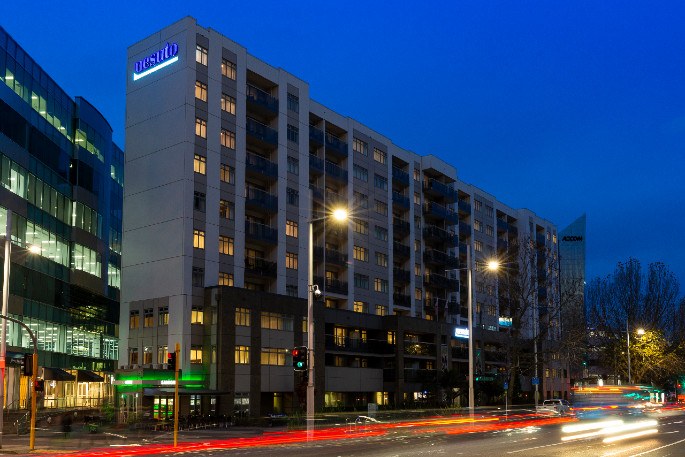Nesuto Stadium Hotel and Apartments is currently on the market, waiting for a new owner.
The 244-room, 4.5-star hotel and apartments located near the waterfront of Auckland’s CBD at 40 Beach Road, and will be offered for sale by an international expression of interest campaign closing at 4pm on Wednesday, June 1.
The hotel was originally built in 2008 as 178 strata-titled luxury residential apartments but was subsequently converted to serviced apartments offering short and extended stays.
The hotel was originally built in 2008 as 178 strata-titled luxury residential apartments but was subsequently converted to serviced apartments offering short and extended stays.
In 2019 and 2020, the current owners undertook a comprehensive expansion and upgrade of the hotel, converting some of the larger apartments into dual hotel rooms and increasing the room number to 244, comprising 100 self-contained one and two-bedroom apartments and 144 hotel rooms.
They also built a new restaurant and conferencing facility and undertook a substantial mechanical and service upgrade meaning the hotel presents in ‘as new’ condition.
The hotel is being hosted for sale by hotel experts Colliers.
The Nesuto is situated just 300m from Auckland’s Spark Arena, the city’s largest indoor, multi-purpose events centre. This key demand driver has historically ensured the hotel runs at very high occupancy levels, says national director of hotels at Colliers Dean Humphries.
Being located near the waterfront, and only five minutes’ walk from the Britomart Transport Centre, Commercial Bay, and the Viaduct Harbour makes this a popular hotel for a wide range of guest segments. Dean says the Nesuto is one of only a handful of hotels in the Auckland CBD that provides a mixture of hotel units and self-contained apartments as part of their inventory.
"This provides a unique selling point as the hotel can pivot from the traditional revenue stream associated with international tourists to other revenue opportunities if the market changes.
"The COVID-19 pandemic was a case in point when the hotel was popular with extended stay guests and is currently contracted to the government as part of the New Zealand Refugee Resettlement Strategy. Accordingly, the hotel is now enjoying near full occupancy, while the overall market undergoes its recovery phase."
Senior investment analyst for hotels at Colliers Jackie Su says during and post the pandemic, one of the key emerging trends is the strong demand for hotels that can cater for the extended stay market.
"These hotels cater for guests staying longer periods (between one week to three months) predominantly in hotels that offer self-contained units, including kitchen and laundry amenities," Jackie says.
"Investors are increasingly attracted to these assets as they can offer significantly higher profit margins (50 per cent or more of revenue) often double that of more traditional hotels. These high profit margins are achieved by a lower operational cost structure, particularly the requirement for less staff, which is a massive advantage in today’s environment with an acute shortage of human resources in the wider industry.
"In the case of this hotel, the management lease to Japanese conglomerate Daiwa House Group provides more than 52 per cent of total revenue back to the owner as net earnings.
"Additionally, the hotel has a unique range of alternative and value-add uses given it was originally designed as a strata-titled residential development, including residential, aged care or health care, which are allowable under the planning scheme and in recent times have seen a surge in popularity across the world."
Head of hotels for Colliers Australia Gus Moors says the Auckland CBD remains the number one destination in New Zealand where investors want to secure hotel assets.
"It is seen as an international gateway city and primary economic hub hence its popularity.
“Unfortunately for those investors wanting to secure hotel assets in the city, it is challenging as they remain tightly held and on average only one major hotel has sold per year during the past decade," Gus says.
"As with the majority of waterfront real estate in the Auckland CBD the underlying land is of leasehold tenure. In this case, the land forms part of a wider landholding owned by one of the largest landowners in Auckland, the NZD$1.2 billion Ngāti Whātua Ōrākei. The hotel is subject to a 150-year lease over the land with approximately 124 years remaining."
Dean notes the current constraints in the building sector, including record building costs and labour and material shortages, renders any new hotel development unfeasible in the current environment.
The cost to replace Nesuto Stadium in the current climate would easily surpass NZD$100 million, he says.



